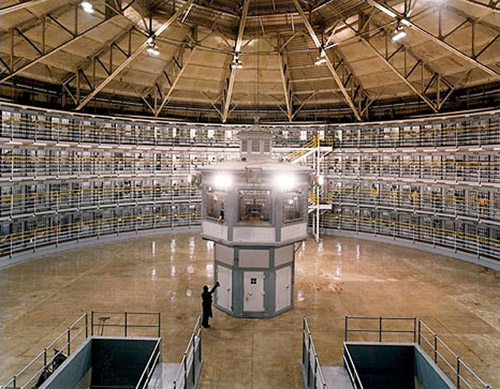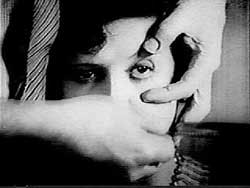This fall I'm teaching a new class called 'Cultures of the Camera' which examines not the image but rather the 'gaze' and the act of looking. If you're interested, I've made the
syllabus and all of our
readings available in pdf online. We mainly look at two things. The first is what the eye symbolizes in the West - as well as what all of the prostheses of the eye have meant. Second, we look at how power has been reflected in various architectures of looking: reality TV, gender, exhibitionism, voyeurism, police power, sousveillance, war
, Americas Most Wanted,
Girls Gone Wild, etc. Should be interesting. I'm ending with an exploration of the mirror as symbol (i.e. looking at oneself). So if everything goes right, the entire universe ought to collapse into a singularity at the end, which is to my mind the ideal way to finish a course.
A bit of the class examines the implications of Bentham's panopticon prison, Foucault's elaboration of it as an architecture of power, and how this notion is threaded through camera cultures, the miniaturization of the camera, and other technological changes. A natural choice, I think.

Yesterday, I was re-reading the interview with Foucault from
Power/Knowledge regarding the panopticon entitled "The Eye of Power." He has a real knack for taking such a mechanical subject and infusing it with energy. A passage stood out. In describing the shape of the structure, Foucault mentioned it had a central tower "
pierced" with windows. I thought this was a curious metaphor. The image from
La Chien Andalou was the first thing to cross my mind, especially considering the title of the interview and Foucault's links to surrealist thought. Bataille's
Story of the Eye, too.

Foucault's piercing metaphor conjured a second association: the panopticon's tower is a stand-in for the phallus and the observed prison standing in for the vulva - a kind of sexual Rosetta Stone for power architectures. As I considered this, I was stunned it had never occurred to me in all these years. What stunned me more was that Foucault had never mentioned it or even implied these associations anywhere. Of course, Foucault is not one to subscribe to ideas of sexual essence or anything less than an absolutely fluid gender produced by power relations. Archetypes are just not his game.
In any case, in the tower-phallus coupling we have the missing link between the eye and the masculine archetype that polices the microphysics of power - observability, accountability, and perhaps, via some circuitous route, the
word. Of course, this connection is obvious in the French as both
savoir (knowledge) and
pavoir (power or purview) both contain
voir (a variant of "to see"). The archetype of power is to see and not be seen, as in the image of the police officer with mirrored sunglasses. This is true for the tower as well, which, according to Foucault, wears its own shades so that its true power of observation remains invisible. His point is that the existence of the tower is enough, regardless of whether or not anyone occupies the tower. The radiating lights that shroud the tower in the above picture signify this radiation of power. Like God, the visible invisibility of power is proof of its omnipresence. These are also the basics of war strategy, though Foucault's power is not about one force conquering another but rather about an architecture that conquers everyone.
We can also follow the faculty of sight along metaphysical lines too. Epistemological foundationalist thought (Platonic, Cartesian) elevates sight to the highest of the senses - making it synonymous with truth, a highly masculinist formulation. Anti-foundationalist thought, on the other hand, has been quite adamant in denouncing "the spectacle," in some Critical Theory quarters, and the fascism of observation, as in Foucault's maxim "visibility is a trap."
Martin Jay has a wonderful book on this subject. Foucault's project thus can be seen as a kind of castration, a destruction of the eye-phallus power coupling - a "piercing" of the phallus, as it were. We're way over the destruction of the eye (just see any Mel Gibson film). If there is one thing that cannot be shown on television or in film, it is the the phallus, because turning the gaze back on the phallus represents the reversal and undoing of power: the
penetration of the penetrator. At the extreme end, the ultimate underground image of
that-which-cannot-be-seen is the the actual piercing of the phallus itself, an image that, kind reader, I will refrain from reproducing here.

